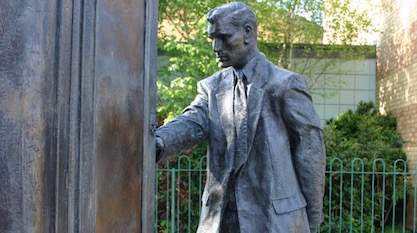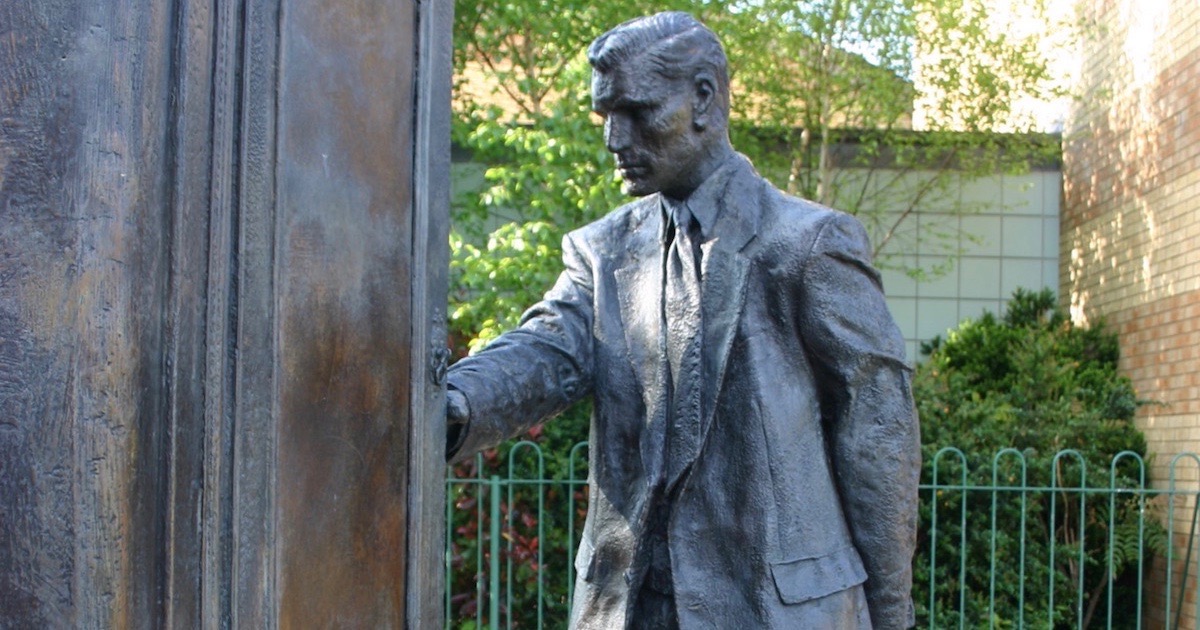 Faith & Science
Faith & Science
Michael Aeschliman and the Consolation of Man


Editor’s note: This month, Discovery Institute Press celebrates our reissuing of a classic, The Restoration of Man: C.S. Lewis and the Continuing Case Against Scientism, by Michael D. Aeschliman. The book’s second edition was published in 1998 with this Foreword by the one and only George Gilder.

Jeffrey Dahmer trading cards, O.J. mediamania, pornographic college film festivals and seminars, internet pedophile chat, astrological 800 lines, condom sculptures at Harvard Divinity School, Hitler memorabilia, Presidential bedroom farce, In Cold Blood revived as great literature, Mapplethorpe as great art — what is going on in American culture? And, whatever it is, does it have anything to do with the simultaneous incandescence of science and technology: the announced successes of an entirely materialistic and evolutionary account of the nature and destiny of man, and the creation of computer technology that has already defeated the world chess champion and will soon achieve a power and complexity comparable to the 10 billion neurons in the human brain?
Turning for relief and consolation to the work of C. S. Lewis, Michael Aeschliman offers a brief, brazen, brilliant text that points to the stark, unmentionable answer. Asserting Lewis’s perennial philosophy — “Good is something objective, and reason the organ whereby it is apprehended” — he centers his work on the crucial faith that sustains civilized life: God is good and will prevail. He shows that, estranged from God, both art and science become incoherent babble, sliding toward an obsession with the prurient lure of triumphant evil.
In Lewis’s words from Thucydides, “Simple goodness… was mocked away and clean vanished.” As Lewis observed in 1936, Aeschliman affirms today the increasingly obvious fact that “the power of painting virtue convincingly” has been lost to art. Since nothing else is truly worthy of aesthetic effort, this insight betokens a death of art itself.
Relativize the absolute, Aeschliman points out, and you absolutize the relative. You create a level playing field for Gresham’s ratomorphs and monkeys proudly wagging their pointed tails on Jerry Springer’s TV stage.
Science Teeters, and Falls
Eclipsing the realm of absolutes defined by God, science itself teeters and falls into the resulting maw of relativism. With the hierarchies of mind and matter upended, right reason gives way to inductive fact mongering on the moral flatlands of the worldwide web. Blowing away the ladders to value and divinity, not only goodness and beauty but also scientific truth becomes a meaningless triviality. “The more the Universe seems comprehensible the more it also seems pointless,” as Nobel laureate physicist Steven Weinberg avers. As a defense of civilization, this blank banner serves as a poor proxy for the Ten Commandments. Giving up on mere common sense, Homo sapiens readily defers to the higher authority of Homo sciens, only to degenerate, almost immediately, to Homo sentiens, summed up less by what he thinks than by what he feels.
Left with only the residues of reductive science, the purpose of human life shrinks to mere pleasure-seeking. Worshipping only the great god Hedon, people pursue not science but sexual pleasure as the paramount good. Beckoning seductively to the pilgrim on his regress toward Vanity Fair, Hedon distends into a great phallic totem of faith. Whether among teenagers, adulterers, or priests, sexual activity is deemed a precious “affirmation of life” (presuming, of course, that no life is created).
With sexual pleasure as the one imperious good, all values are inverted. God, for example, standing as an obstacle to abortion and sexual pleasure, becomes bad. In this faith of atheistic culture and science, AIDS victims emerge as the only moral paragons. They achieve sainthood by sacrificing their lives for sexual pleasure.
A Second Thing into a First Thing
Aeschliman’s five chapters render such absurdities as an intelligible and inexorable expression of the struggle between sapientia and scientism, between the common sense of purpose and transcendence, and the senseless spectacle of scientists committed to the purpose of proving themselves purposeless. As Lewis insisted, making a Second Thing (empirical science) into a First Thing (a permanent verity) is destructive to the Second Thing. Science, like “philosophy, that leaned on heaven before / Shrinks to her second cause and is no more” (Pope). The exaltation of science into a religion subverts both science and religion and leaves a wasteland. Science, as Aeschliman puts it, is a good servant but a bad master.
Neither science nor technology, as Aeschliman shows, is likely to prosper long in a culture that defies all transcendent meaning and purpose. Today intellectuals are engaged in a suicidal war against mind itself, which is of course the indispensable wellspring of science. Denying that mind transcends matter, they reduce their own thought processes to mere biochemical reactions. Denying transcendence, spurning spirit, they become random aggregations of mutant carbon molecules, inferior to emergent silicon life. Attempting to distill mind from matter, as Max Delbruck, Nobel laureate chemist put it, they resemble Baron von Munchausen trying to extract himself from a swamp by pulling on his own hair.
The Materialist Superstition
Putting Lewis gracefully in the context of the nearly eternal debate between a reductive scientism and a balanced wisdom he terms sapientia, Aeschliman warns that “deterministic thinking eats away at the common reason.” Science begins by scouring away superstition and falsehood and then embraces the most insidious of all modern falsehoods: the materialist superstition. This is the belief, unsustainable even in modern physics (the supreme science of matter), that matter is all there is. This superstition of scientism “ends by devouring truth as well, leaving only the bones and orts of physical reality.”
Aeschliman luminously exalts from the colossal range of Lewis’s oeuvre a towering central theme: the “restitution of man,” the restoration of the human person as a category. The moral core of a redemptive art and science is to save our souls from a materialist heresy — a “nothing buttery” — that would reduce us to nothing but a “part of nature, in the same sense that a stone is, or a cactus, or a camel.” A scientism that thus abolishes man also abolishes God and nullifies the reason of the materialist scientist. Any theory that denies the transcendence of the theorist is self-refuting. As Aeschliman puts it, “By implicitly undercutting the validity of rational thought, the modern naturalists render meaningless and self-contradictory all that they have to say… To say, with the radical empiricist, that only factual statements have validity is to be not only dogmatic but also self-contradictory, since the statement itself is not factual.” Lewis called this materialist superstition “the sweet poison of the false infinite.”
Quoting Stanley Jaki, the physicist, Aeschliman affirms that real science began not with Francis Bacon’s random aggregations of facts but with the preceding recognition that the world was rational and thus could be grasped by human reason. As a product of a transcendent Creator, however, rationality could not be derived from the mind of man, his creature, alone. Here is the central paradox. The world can be apprehended by human reason only to the extent that reason transcends man and partakes of divine permanence.
A Minor Miracle
This book is short while Lewis is voluminous. Yet Aeschliman achieves a minor miracle in distilling the essence of Lewis’s multifarious learning into five chapters. Bringing Einstein, the great deist, to the bar, he quotes, “Religion without science is lame, but science without religion is blind.” Scientism declares all facts objective and all values subjective and subordinate to facts. Objectivity and subjectivity glower at each other across an unbridgeable chasm.
God is the only bridge that can link mind and matter and give meaning to both. The idea of mindless matter engendering meaningful subjectivity is on the face of it far less credible than the idea of an ultimate subjectivity — God — giving rise to subordinate consciousness and reason in his preferred creatures. The ultimate effect of scientism is “to dissolve the absolute qualitative distinction between persons and things,” leading to the “abolition of man” — in Lewis’s phrase, putting things in the saddle to ride mankind.
Let us hope that the republication of Aeschliman’s study can serve as an urgent remedy for this degeneration. At a time of technological triumphalism, it is more imperative than ever to assure that the triumph of science is a triumph of mankind, not over it. This book is an essential guidebook to the perils of scientism and the promise of a real and enduring science under God.
Photo: C.S. Lewis, statue, Belfast, Northern Ireland, by Genvessel [CC BY 2.0], via Wikimedia Commons.
